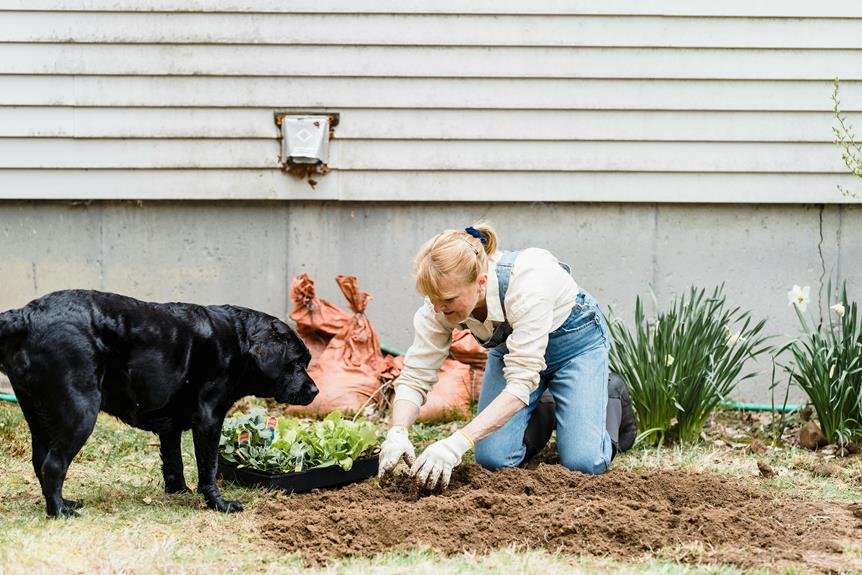
If your dog's digging habits are leaving your yard looking like a construction site, don't worry – there are practical solutions to address this behavior. Understanding why your furry friend is digging can shed light on effective strategies to curb this activity. By exploring the root causes and implementing targeted interventions, you can foster a harmonious relationship with your pet and maintain a pristine outdoor space. So, let's delve into the world of dog behavior and discover how you can put an end to the digging dilemma.
Common Reasons for Digging
If your dog is constantly digging in the yard, it may be due to a variety of common reasons. One possible cause is boredom. Dogs, like humans, need mental and physical stimulation to stay happy and healthy. If your furry friend is left alone in the yard for long periods without any entertainment, digging may become a way to pass the time.
Another reason could be the need for attention. Dogs are social animals and crave interaction with their owners. If they feel neglected or lonely, they might resort to digging as a way to seek your attention.
Additionally, digging can be a natural instinct for some breeds. Dogs with a history of hunting or burrowing, such as terriers, may dig to satisfy their innate drive. It's essential to understand your dog's breed tendencies to address this behavior effectively.
Lastly, environmental factors like heat or seeking shelter can also prompt digging. Providing adequate shade and comfortable resting areas can help deter this behavior.
Signs of Problematic Digging
One clear indication of problematic digging in dogs is when they consistently target specific areas in the yard. If you notice that your furry friend keeps digging in the same spot over and over again, it could be a sign of an underlying issue. Dogs may focus on particular areas due to a variety of reasons such as seeking buried items, trying to escape, or attempting to create a comfortable resting place.
Another sign of problematic digging is when your dog's digging behavior becomes excessive and starts causing damage to your yard or garden. Constantly finding holes in your yard or uprooted plants can be frustrating and indicate a need to address the behavior. Additionally, if your dog seems obsessed with digging to the point where it interferes with their daily activities or causes distress, it may be a sign that the digging has become problematic and requires intervention.
Understanding these signs can help you identify when your dog's digging behavior needs to be addressed.
Tips to Discourage Digging
To discourage digging in your dog, consider implementing some effective strategies that can redirect their behavior towards more appropriate activities. First, ensure your dog gets enough physical and mental exercise to prevent boredom, a common cause of digging. Provide interactive toys, regular walks, and playtime to keep them engaged. Additionally, designate a specific digging area in your yard filled with sand or loose soil where it's acceptable for them to dig. Encourage your dog to use this spot by burying toys or treats for them to find.
Another tip is to supervise your dog when they're outside. If you catch them digging, firmly say 'no' and redirect their attention to a different activity. You can also try using deterrents like placing rocks or chicken wire in the areas they frequently dig to make it less appealing. Consistency is key when discouraging digging, so be patient and stick to the chosen method. By implementing these strategies, you can help curb your dog's digging behavior and create a more harmonious environment in your yard.
Positive Reinforcement Training
Implement positive reinforcement training techniques to encourage desired behaviors in your dog, such as digging in designated areas. When your dog digs in the designated spot instead of random areas, reward them with treats, praise, or playtime. Positive reinforcement works by associating the desired behavior with a pleasant outcome, making your dog more likely to repeat it. Consistency is key; always reward your dog when they dig in the designated area. Additionally, you can use a command like 'dig' when your dog is in the right spot to reinforce the behavior.
To further reinforce positive digging habits, consider burying toys or treats in the designated area for your dog to find. This not only encourages digging in the right spot but also provides mental stimulation. Remember, redirecting your dog's behavior positively is more effective than punishment. By using positive reinforcement training, you can teach your dog where it's appropriate to dig, leading to a harmonious relationship between you and your furry friend.




